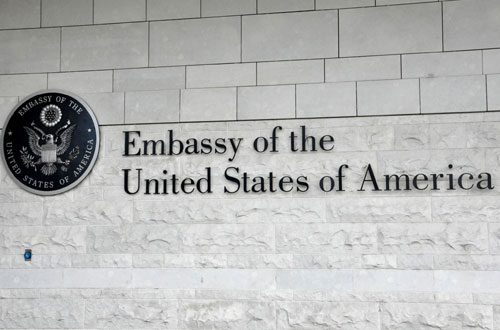| U.S. Embassy on Electoral Legislation |
| Civil Georgia, Tbilisi / 29 Dec.'11 / 17:47 |

Photo: InterPressNews
The U.S. Embassy in Tbilisi expressed “concern” over retroactive application of new regulations for party funding, which was approved by the Parliament on December 28 and which went into force on December 29.
“We are concerned that retroactive application of certain campaign finance provisions would reinforce existing imbalances in political competitiveness,” the U.S. Embassy said in a statement on December 29.
Referring to a recently passed new electoral code, the U.S. Embassy said: “We regret that there was no agreement on elements of the new code that would have addressed lingering perceptions on inequality within the electoral system.”
The Council of Europe’s advisory body for legal and constitutional affairs, Venice Commission, has long been recommending Georgia to secure equality of vote through establishing approximately equal sized single-mandate, majoritarian constituencies. Wide disparity between the constituencies - ranging from less than 6,000 voters in the smallest constituency to over 150,000 voters in the largest one – is not addressed in the new election code.
“As the work of building a democracy is never complete, we urge the Government of Georgia to continue to work in close consultation with opposition parties and civil society to ensure that the 2012 elections are free and fair and enjoy broad credibility,” the U.S. embassy said.
Bellow is full text of the statement by the U.S. embassy:
“The United States is committed to free, fair and credible elections in Georgia. Our focus is on the process, and we do not support any particular party or candidate.
In that spirit, the United States embassy takes note of the Electoral Code and the amendments to the Law on Political Unions relating to campaign and political party finance approved by Parliament this week.
We believe many of these legislative changes, if coupled with successful efforts to address real and perceived irregularities in the voters’ lists, will contribute to a more competitive campaign environment for the 2012 parliamentary election.
We regret that there was no agreement on elements of the new code that would have addressed lingering perceptions on inequality within the electoral system.
We are concerned that retroactive application of certain campaign finance provisions would reinforce existing imbalances in political competitiveness.
As the work of building a democracy is never complete, we urge the Government of Georgia to continue to work in close consultation with opposition parties and civil society to ensure that the 2012 elections are free and fair and enjoy broad credibility.
The United States will continue to support the efforts of the Georgian government, political parties and civil society in the future as the Georgian people seek to strengthen further the institutions and processes of Georgian democracy.”
